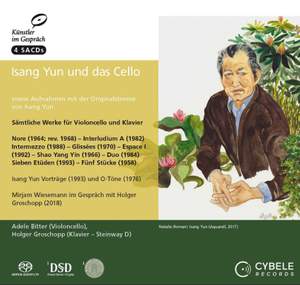Anniversary Edition Artists in Conversation Vol.11: ‘In my mind I was free’ (Isang Yun). Isang Yun’s life is multifaceted and gripping like a well-written novel. His complex character, with all its polarities and conflicts considering the challenges he confronted, provides the material for many chapters of human, artistic and historical relevance: Not only because of his spectacular abduction from West Berlin to Seoul (South Korea) in the late 1960s, which we hear him depict in his own words in tense and heartfelt terms, as part of his overall personal trajectory. No, also because, indeed especially because, of his fascinating work: Yun developed over decades a unique and totally distinctive language made up of the eastern and western influences that had formed him, so that he could say at the end of his life, The split within me has been fully overcome, even if the partition of his beloved homeland Korea caused him suffering to the very end.
‘The cello was like my spouse,’ as we hear Isang Yun report in archival recordings (1976, SACD2-4) in which he also tells in detail about his spectacular kidnapping and imprisonment in Korea.
It is therefore quite fitting that this most autobiographical instrument for Yun, as Holger Groschopp says in his conversation with Mirjam Wiesemann (SACD4), is the focal point of this celebratory production marking the 10th anniversary of our Artists in Conversation Edition.
Of his great Cello Concerto (1975/76), for example, Yun said: ‘As the cello was my favourite instrument from my childhood onward, I took it as the focal point.’ He regarded the cello as his own beautiful, weak voice, to be confronted with the dramatic, destructive world.
The works (SACD1/2), interpreted by Adele Bitter (cello) and Holger Groschopp (piano), resemble a portrait sketch, the art of capturing with a mere few strokes an impression of one’s personality. The chosen pieces point to various stages in the output of Isang Yun, from his earliest compositions written in Europe to a new, indeed ‘his own’, style, to one of his last works, the Seven Études for Cello solo.
‘Every listener sees my position between east and west differently, and that’s right,’ says Isang Yun. ‘One can hear my music either way, as eastern or western. That one can do so shows exactly where my place is.’



